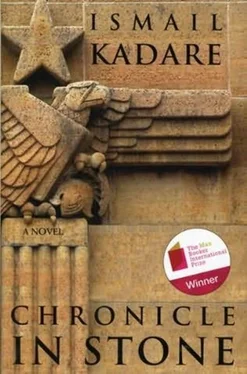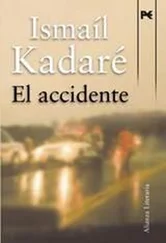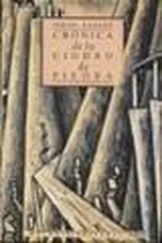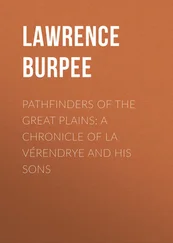Ismaíl Kadaré - Chronicle in Stone
Здесь есть возможность читать онлайн «Ismaíl Kadaré - Chronicle in Stone» весь текст электронной книги совершенно бесплатно (целиком полную версию без сокращений). В некоторых случаях можно слушать аудио, скачать через торрент в формате fb2 и присутствует краткое содержание. Жанр: Современная проза, на английском языке. Описание произведения, (предисловие) а так же отзывы посетителей доступны на портале библиотеки ЛибКат.
- Название:Chronicle in Stone
- Автор:
- Жанр:
- Год:неизвестен
- ISBN:нет данных
- Рейтинг книги:4 / 5. Голосов: 1
-
Избранное:Добавить в избранное
- Отзывы:
-
Ваша оценка:
- 80
- 1
- 2
- 3
- 4
- 5
Chronicle in Stone: краткое содержание, описание и аннотация
Предлагаем к чтению аннотацию, описание, краткое содержание или предисловие (зависит от того, что написал сам автор книги «Chronicle in Stone»). Если вы не нашли необходимую информацию о книге — напишите в комментариях, мы постараемся отыскать её.
Chronicle in Stone — читать онлайн бесплатно полную книгу (весь текст) целиком
Ниже представлен текст книги, разбитый по страницам. Система сохранения места последней прочитанной страницы, позволяет с удобством читать онлайн бесплатно книгу «Chronicle in Stone», без необходимости каждый раз заново искать на чём Вы остановились. Поставьте закладку, и сможете в любой момент перейти на страницу, на которой закончили чтение.
Интервал:
Закладка:
“Look,” Ilir said, “Look over there.”
In the distance the contours of the city could just be seen in the murky mix of night and day. It was the first time I had seen it from afar. I almost shouted for joy, for all night I had had the feeling that it was sinking lower and lower into the mud of the plain, like an old ship foundering on the shore.
But now the contours of the landscape had finally flung the impish genies from their back and were gradually recovering their shapes in the daylight. Only the grey eyes of Nazo’s daughter-in-law still held something of the magic of the night.
The city was far away, caught in the clumsily opening jaws of the fog. The crones were down there. Grandmother and Aunt Xhemo, with their cracked glasses perched on their noses, were keeping watch over the road from their respective windows, waiting to catch a glimpse of the men with yellow hair. Clues had been perceptible for some time. Now the signs were unmistakable: Grandmother and Aunt Xhemo were getting ready to turn into crones. The German invasion seemed to be the definitive test for them, as the great incursions of the Turks, the massacres on the ruins of the republic and the monarchy, and the forty years of constant hunger had been for other crones.
“Let’s move,” said Bido Sherifi. “We’re nearly there.”
We got up. I was almost asleep on my feet. It was a painful slumber, cut and torn by the jolts passed to my body by the holes in the road.
Then someone said, “This is it. We’re here.”
I opened my eyes.
“We’re here!”
“Where?”
“Here.”
I had no idea where I was.
“In the village?”
“Yes, in the village.”
“Where is it?”
“Right there.”
I looked around in bewilderment. So this was what they called a village! I was dumbfounded, then suddenly burst out laughing.
“What’s the matter? What’s wrong with you?” asked Nazo’s daughter-in-law.
I couldn’t stop laughing.
“Lord above, now my child’s lost his mind!” my mother said.
“What’s the matter with you?” my father asked sternly.
“But… don’t you see?… those houses… over there?”
“Now stop that,” my father commanded.
My mother shook me by the shoulders, then put her arms around me.
I couldn’t believe what I was seeing. These low shacks with whitewashed walls looked to me like dolls’ houses. They weren’t even lined up in a row so as to form one side of a street facing the other side in a virtually permanent state of rivalry, taunting each other with a sneering challenge: “You want to see who’s bigger, do you?” No, it was all different here. To prevent such squabbling, the cottages were separated from each other as if they were all in business on their own accounts. And to top it all, they were surrounded by patches of tilled land, chicken coops, haystacks and doghouses.
The villagers stared in amazement as our little group made its way across an open space. Two or three frightened kids hid behind their doors. A cow began to moo. More peasants came out. They had kindly features, the sun was in their hair, and they smelled of fresh milk.
I could hear cowbells tinkling. My eyes closed.
I woke up halfway through the afternoon. I was in an empty room. My father was hanging paper over the windows to replace the broken panes, while my mother cleaned the floor, which was filthy with dried-out chicken droppings. It all seemed very depressing to me.
In a little while Bido Sherifi’s wife and Nazo came.
“So, are you settled in?” they asked.
My mother pursed her lips.
“What about you?”
“Not so bad. We found an abandoned house.”
Bido Sherifi’s wife heaved a deep sigh.
“How did we get into this mess?”
They left.
I felt like crying. Suddenly I was terribly homesick for our house and the city. Had something irreparable happened?
Papa went down to the cellar and came back up.
“Be careful not to light a fire,” he said. “It’s full of hay down there. If it goes up we’ll burn like mice in a barn.”
Mane Voco came by. He had lost a lot of weight since Isa was hanged.
“Do you have a little salt?” he asked. “We forgot to bring any.”
My mother gave him some.
The house we were in was also abandoned. The other room was a wreck. I went downstairs to see the hay.
“A-oo,” I said at the cellar entrance.
There was no answer.
The hay we were worried about had a heady tang. I went back up to the room wondering why we always lived in houses with some danger underneath. In the city it was the water in the cistern, here the threat of fire in the cellar.
Refugees from the city passed by all day. Some stopped in the village and moved into deserted houses like we had. Most kept going, looking for villages farther away. I noticed Qani Kekezi among the people walking by with bundles and cradles. Bits of newspaper, cigarette butts and gossip trailed in the refugees’ wake. Back in the city Gjergj Pula had been killed. He had just applied to change his name again, to Jürgen Pulen. (The rumour was that apart from Giorgio, Yiorgos and Jürgen, which he never got a chance to use, he had lined up the name Yogura in case of a Japanese invasion.)
Refugees passed through the villages all night long. I slept fitfully, a sleep interrupted by tinkling bells, the lowing of cattle, and knocking at doors.
I was still asleep when I heard Xhexho’s loud voice from the street.
“Where are you, my friends? I’ve been looking for you everywhere. Where are you, poor things?”
She burst in the door. Bido Sherifi’s wife and Ilir’s mother ran to her.
“Xhexho, do you have any news? What’s happening?”
Xhexho started pacing up and down the room, then brought her hands to her cheeks.
“My God, how low we have fallen! Wandering the road like Romanies. Scattered like a raven’s chicks. What kind of a pigsty is this? How did you end up here? Why has God let us live, to be reduced to this? What a catastrophe!”
“Enough, Xhexho! It’s not as if we took to the road for the fun of it. We had no choice but to flee evil,” said Bido Sherifi’s wife. “What news have you brought?”
“I don’t know where to start. Did you hear what happened to Çeço Kaili’s daughter? She went off with the Italians.”
“With the Italians?”
“Lately her beard got as long as Mullah Kasemi’s. The barber was at Kaili’s house every day with a bag full of all kinds of razors, even the ones the Franks make. There was no other choice. Nothing else worked. Then one night she just got up and left. They say it was the barber who set it up. She got into the truck that took the girls from the brothel.”
“Maybe the terrible bad luck that has befallen the city has left with her,” said Xhexho. “After all, that girl with the beard did bring bad luck. It’s a good thing she left,” Xhexho added, surprising everyone with the uncharacteristically hopeful words she had spoken. But her optimism was short-lived. Raising her voice, which sounded like a dull whistle coming through her nose, she nearly shouted, “No, it won’t leave us alone just yet! Have you heard what they’re saying about Maksut, Nazo’s boy? He’s a spy! Yes, a spy!”
“A spy?”
“That’s what I said. A snake in the wall. That’s why he let his wife and mother come here alone; he’s afraid of the partisans. He’s in hiding, hasn’t turned up anywhere. They say he’s waiting for the Germans. He sends them information at night and tells them which roads to take. They say he’s the one who reported Isa.”
Ilir’s mother broke into sobs.
“The cur, the cur,” she cried.
Xhexho sighed deeply.
“Avdo Babaramo still hasn’t found his son’s body,” she said in a less excited voice. “The poor man is still on the road, looking everywhere. But now we’re all on the road.” Xhexho raised her voice and added: “Like wandering Jews!”
Читать дальшеИнтервал:
Закладка:
Похожие книги на «Chronicle in Stone»
Представляем Вашему вниманию похожие книги на «Chronicle in Stone» списком для выбора. Мы отобрали схожую по названию и смыслу литературу в надежде предоставить читателям больше вариантов отыскать новые, интересные, ещё непрочитанные произведения.
Обсуждение, отзывы о книге «Chronicle in Stone» и просто собственные мнения читателей. Оставьте ваши комментарии, напишите, что Вы думаете о произведении, его смысле или главных героях. Укажите что конкретно понравилось, а что нет, и почему Вы так считаете.












